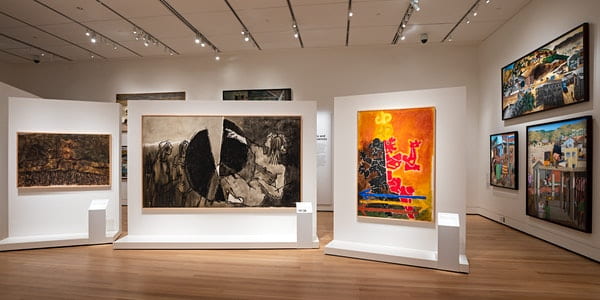Sunday, August 15, 2021
10:00AM
Online
Join International House as we partner with Kalapriya Center for Indian Performing Arts for the Cultural Sundays Series. The Radcliffe Line is the boundary between the Indian and Pakistani portions of the provinces of Punjab and Bengal, named after its architect: Sir Cyril Radcliffe. Announced on the 17th of August 1947 – days after India and Pakistan acquired independence from British Rule – Radcliffe’s Line generated violent upheavals as millions migrated in haste across the new borders. Based on works in the new South Asian Galleries at the Peabody Essex Museum, this session traces the impact of the Line in Modern art on both sides of the border. We discuss how seemingly abstract motifs – zig zagging diagonals, split circles and bifurcated triangles – serve as visual metaphors for the painful parting of ways on the one hand, and for the birth of fledgling nations on the other.
Registration is required. | Suggested Donation: $15
This program is cosponsored by the International House Global Voices Program and Kalapriya Center for Indian Performing Arts.
Dr. Siddhartha V. Shah is the Director of Education and Civic Engagement, and Curator of South Asian Art, at the Peabody Essex Museum in Salem, Massachusetts, which is home to the largest and most important collection of modern Indian art outside the subcontinent. He is interested in the conflicts and intersections between religion and modern art, as well as the visual and material culture of the British Raj. He received his BA in art history from The Johns Hopkins University, an MA in East-West Psychology from The California Institute of Integral Studies, and a PhD in South Asian Art from Columbia University. His academic and curatorial projects have been featured in publications ranging from The Times of India and India Today, to The New Yorker, The Wall Street Journal, and Psychology Today.
Dr. Zehra Jumabhoy is a UK-based art historian, curator and writer specialising in modern and contemporary South Asian art and its diasporas. She is interested in exploring and analysing the socio-political contexts of South Asian art history. She was the Steven and Elena Heinz Scholar at the Courtauld Institute of Art, London, where she completed her doctorate and has lectured on undergraduate and postgraduate programmes (2016-2020). She is currently lecturing on the MA in “Asian Art Histories” at Lasalle College of the Arts, Singapore. In 2018, she co-curated the landmark exhibition, The Progressive Revolution: A Modern Art for a New India, at New York’s Asia Society Museum. She is now Curatorial Research Fellow at Glynn Vivian Art Gallery in Swansea, a position funded by the Paul Mellon Centre for British Art, working on a number of projects including the major exhibition, Imperial Subjects: (Post)Colonial Conversations between South Asia & Britain, scheduled for 2022.
Dr. Guneeta Singh Bhalla is founder of The 1947 Partition Archive, an organization that documents oral histories from survivors of India and Pakistan’s 1947 Partition, also known as the world’s largest mass refugee crisis. Previously, she was an experimental condensed matter physicist who completed her tenure as a post-doctoral researcher at the Lawrence Berkeley National Laboratory and the Department of Physics at the University of California at Berkeley. Her father’s family migrated from Lahore to Amritsar in 1947, a history she never formally learned about in school. Motivated by the desire to bridge the disconnect between folk history and formal history, she was inspired during a 2008 visit to the oral testimony archives at the Hiroshima Peace Memorial and began interviewing Partition witnesses in 2009. It was a deeply enriching experience and she wanted to share it with everyone. She was also troubled with the realization that the generation of eye witnesses was nearly gone and taking their stories with them. This led to the concept of crowdsourcing oral histories of Partition, thereby engaging the public in recording the people’s history of the world’s largest mass human displacement. She gathered a team and began recording oral histories in 2010. In 2011 The 1947 Partition Archive was born and has through today documented nearly 10,000 Partition witnesses accounts. Guneeta is passionate about telling history from the ground up, and empowering everyone to tell their story. Guneeta believes that our true collective history is made up of the lived experiences of everyone, and is thus devoting her life to raise the curtain on unheard voices from some of the most marginalized and underrepresented communities.
